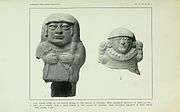Tongji (spirit medium)
| Part of a series on |
| Chinese folk religion |
|---|
 |
|
Internal traditions Major cultural forms
Main philosophical traditions: Ritual traditions: Devotional traditions: Confucian churches and sects: |
| Chinese folk religion's portal |
Tongji (Chinese: 童乩; pinyin: tóngjī; Wade–Giles: t'ung-chi; literally: "youth diviner"; Tâi-lô: tâng-ki) or Jitong (Chinese: 乩童; pinyin: jītóng; Wade–Giles: chi-t'ung; literally: "divining youth") is a Chinese folk religious specialist, usually translated as a "spirit medium", "oracle", or "shaman".
This word compounds tong 童 "child; youth; boy servant" and ji 乩 "to divine" (cf. fuji 扶乩 "divination; planchette writing"). Regional variants include Hokkien tâng-ki 童乩 and Cantonese gei-tung 乩童 or san-daa 神打.
A tongji or jitong is a person believed to have been chosen by a particular shen 神 "god; spirit" as the earthly vehicle for divine expression. The Chinese differentiate a wu 巫 "shaman; healer; spirit medium" who gains control of forces in the spirit world versus a tongji who appears to be entirely under the control of forces in the spirit world.
Frequently a person who will become a tongji to experiences a feeling of compulsion of something that will possess them. The person may attempt to resist that compulsion, but should their resistance fail, they will enter into a trance in which they may beat themselves with a nail-studded ball at the end of a cord and handle to the point that he draws blood from multiple wounds on his back. While in this trance state the tongji is believed to be possessed by a shen.
External links and references
| Wikimedia Commons has media related to Tongji. |
- Andersen, Poul. 2008. "Tâng-ki (or jitong) 童乩 (or 乩童) spirit-medium", in The Encyclopedia of Taoism, ed. by Fabrizio Pregadio, pp. 964-966. Routledge.
- Elliott, Alan J. A. 1955. Chinese Spirit Medium Cults in Singapore. Monographs on Social Anthropology, No. 14. Department of Anthropology, London School of Economics and Political Science.
- Groot, Jan Jakob Maria. 1892-1910. The Religious System of China: Its Ancient Forms, Evolution, History and Present Aspect, Manners, Customs and Social Institutions Connected Therewith. 6 volumes. Brill Publishers.
- Jordan, David K. 1976. "A Medium's First Trance", Anthropology: Perspective on Humanity, ed. by Marc J. Swartz and David K. Jordan. John Wiley & Sons.
- Jordan, David K. 1977. "How to Become a Chinese Spirit Medium".
- Jordan, David K. 1999. Gods, Ghosts, & Ancestors: Folk Religion in a Taiwanese village. 3rd edition. Department of Anthropology, UCSD.
- Myers, John T. 1974. A Chinese Spirit-medium Temple in Kwun Tong: A Preliminary Report. Social Research Centre, Chinese University of Hong Kong.
- Myers, John T. 1975. "A Hong Kong Spirit-medium Temple", Journal of the Hong Kong Branch of the Royal Asiatic Society 15:16-27.
